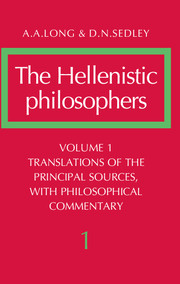The Pyrrhonist revival
from Translations and commentary
Published online by Cambridge University Press: 05 June 2012
Summary
Why to suspend judgement
Diogenes Laertius 9.106–7
(1) Aenesidemus, in the first of his Pyrrhonist discourses, says that Pyrrho determines nothing in doctrinaire fashion, because of the opposition of arguments, but follows appearances. He says the same in his Against wisdom and On inquiry … (2) Hence according to the Sceptics it is what appears that serves as a criterion, as Aenesidemus also says … (3) As end the Sceptics name suspension of judgement, upon which freedom from disturbance follows like a shadow, as the followers of Timon and Aenesidemus put it.
Diogenes Laertius 9.78
Pyrrhonist discourse is a kind of recollection of appearances, or of ideas of any kind, on the basis of which they are all brought into confrontation with each other and, when compared, are found to present much disparity and confusion. This is what Aenesidemus says in his Outline introduction to Pyrrhonism.
Photius, Library 169b 18–170b3
(1) I read Aenesidemus' eight Pyrrhonist discourses. The overall aim of the book is to establish that there is no firm basis for cognition, either through sense-perception, or indeed through thought. (2) Consequently, he says, neither the Pyrrhonists nor the others know the truth in things; but the philosophers of other persuasions, as well as being ignorant in general, and wearing themselves out uselessly and expending themselves in ceaseless torments, are also ignorant of the very fact that they have cognition of none of the things of which they think that they have gained cognition.
- Type
- Chapter
- Information
- The Hellenistic Philosophers , pp. 468 - 488Publisher: Cambridge University PressPrint publication year: 1987
- 1
- Cited by



